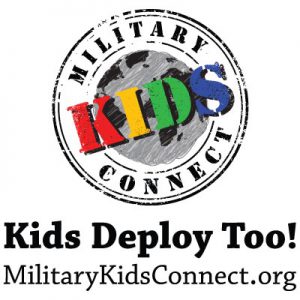The deployment of a loved one is often one of the hardest challenges a military family faces. During a deployment, Service members and family members can experience feelings of loneliness, worry and anxiety. Once
a Service member returns, there is often an adjustment period as routines and circumstances may have changed while they were away.

The stresses of deployment can be particularly difficult for children, which is why the
National Center for Telehealth and Technology, a Department of Defense agency formed in 2008, recently launched a new website aimed at supporting children of military families throughout the deployment cycle.
Military Kids Connect (MKC) is an online community of military children, ages six to 17, which provides access to age-appropriate resources to support children from pre-deployment through a parent or caregiver’s return.
Through monitored online forums, children can use MKC to share ideas, experiences and suggestions for getting through a loved one’s deployment with other military children. For example, in a MKC feature called “
Deployment Daily,” a teenager whose brother was deployed with the Marines shared that staying active and participating in after-school activities had helped deal with the stress and anxiety of having a loved one in harm’s way.
“Probably the most important thing kids told me was to stay busy,” the teenager wrote on the MKC forum. “Lots of the guys played sports. That’s not really my thing, but they got me to thinking. I’m in band and the jazz band tryouts are coming up. I sort of blew off the idea when I first heard about it, but now I think I’ll try out… And my little sister was asking me to help coach her team. I know nothing about T-ball, but how hard can it be?! So I’ve got my plan. I’ll still be totally bummed not having my brother around, but at least now I know how to take care of things.”
The MKC site also includes activities and resources to help younger children deal with the stresses of a parent or caregiver being deployed. The “
Where Are You Going?” feature allows children to learn things about the history, culture and geography of places where their loved one is deploying, including Iraq, Afghanistan and Panama.
MKC also provides tips for how to
re-connect with a parent or caregiver who has returned from a deployment and may be acting a little differently. Older children are encouraged to keep a scrapbook or other record of milestones that may have happened while their loved one was deployed, such as first dates or getting a really good report card. Children are also encouraged to
develop a communication plan and to record even their difficult emotions so they can address them appropriately and effectively when the time is right.
Also included on the Military Kids Connect website is helpful information for people who might be interacting with children of deployed parents, such as educators.
Tips for teachers include information about military structure, culture and vocabulary, as well as
details about the deployment cycle and information about typical
children’s behavior in response to deployments. There are also tips for helping children cope with deployments, such as using deployments as a teaching tool in classes like social studies and geography, inviting military parents to speak to classes, and putting together letters and packages for deployed Service members.

Adults can also struggle with the effects of deployments, and there are resources for them, such as the
AfterDeployment website, a core
Defense Centers of Excellence project led by the National Center for Telehealth and Technology. It is
a wellness resource for the military community with the mission of helping Service members, families and veterans overcome common adjustment issues following a deployment.
AfterDeployment includes resources and exercises such as overviews, assessments and workshops that address post-deployment challenges including post-traumatic stress disorder and triggers, conflict at work, re-connecting with family and friends, depression, anger, sleep problems, substance abuse, stress management, kids and deployment, spiritual guidance, living with physical injuries, health and wellness, and more.
A Service member or spouse could, for example, take a
marital satisfaction assessment on the
AfterDeployment website to determine their current level of marital distress. Resources and recommended actions are then provided based on the results of the assessment, such as discussing your marriage with a healthcare provider or joining a support group.
AfterDeployment includes community resources, such as a
peer-to-peer forum and a
blog. Users can also
access mobile applications, personal stories, behavioral health news and clinical practice guidelines from the site.
While none of these resources are meant to replace in-person medical and psychological care, they can provide additional support to Service members and family members coping with the effects of a deployment. For information on additional available resources, visit the
National Resource Directory or
Military One Source.